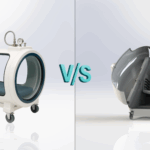As hard as it is to believe: One third of the food produced in the world each year – or approximately 1.3 billion tons — gets lost or wasted. How much of this food waste occurs in our very own homes? More often than not, food gets pushed to the back of our freezers, refrigerators, or cabinets and forgotten about, particularly if you have a big household or family to shop for and feed. We’re left confused and wondering whether even the most common household foods are still safe to eat. There tends to be grey area if items like meats, fruits, or leafy greens are spoiled, especially if they don’t look or smell so! So, we end up tossing food and wasting not just the food itself but our own money. This has a negative impact on our environment, energy, and wallet.
To help clear things up, Kitchen Cabinet Kings put together a helpful guide that breaks down the average lifespan of common household foods. Try referencing this chart next time you grocery shop, for the busy holidays, or start to store food for a rainy day. Simple labels can be helpful to keep track of food before it spoils, to help avoid food waste, and even plan for better health benefits by not eating food that’s gone bad. Check out the full visual below that outlines common foods we eat everyday broken down by your storage medium of choice.
A great way to recycle food, is to invest in a household composting kit. These kits are fairly inexpensive and are available at your local nursery or hardware store. Bokashi is a well known home composting brand. It’s super easy to get started; buy 2 Bokashi bins & a bag of Bokashi bran. Then throw your first offcuts (excl. liquids) into the bin and top with a layer of bran. Close the lid tightly. Repeat these steps until the Bokashi is full. Then leave the bin closed for about 2 weeks. Meanwhile, by using the tap on the side of the bin you can extract the composting liquid. Follow the dilution instructions on the package. The diluted liquid can be used in your garden beds, veggie patches and your lawn.
After 2 weeks, open your Bokashi’s lid, empty the bin into your outdoor compost heap and combine. And there you have it, super fresh, recycled compost.


![[Infographic] How long before food spoils?](https://salvagente.co.za/wp-content/uploads/2018/11/2018-11-07-Infographic-How-long-before-food-spoils-Feature.png)





Leave a Reply